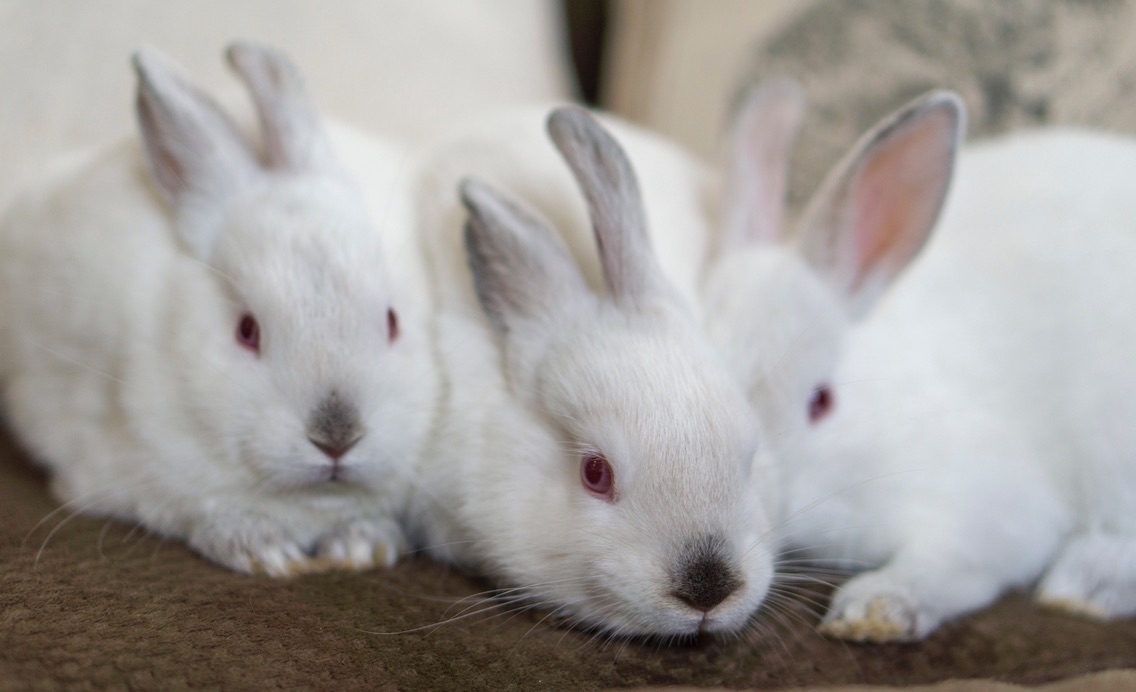
Prior to bringing a new furry friend into your home, it’s important to do your research and learn about basic rabbit care.
To start, you should ask yourself these three basic questions:
- Are you ready to commit 8 to 12 years to being a rabbit parent?
- Are you prepared to spend time, money, and energy on your pet?
- Are all the members in your household onboard with the idea?
If you answered yes to the following questions, you are now ready to learn more about the basic needs of your new pet rabbit.
Basic Rabbit Care
Housing
Your basic setup can differ depending on your home. If you plan on having the rabbit free-roam the whole house, you will need to rabbit-proof the entire area. This means getting rugs and carpeting so you rabbit doesn’t slip. It also means moving anything chewable out of range of your rabbit. Alternatively, you can section of a portion of the space with a pen as the rabbit’s main hub. Either way, you will need to have the following items at hand: a litter box, hay tray, and ceramic bowls for food & water.

In addition, you should stock up on lots of chewing toys, such as willow balls and cardboard boxes, for your rabbit’s entertainment. What a lot of people don’t consider is that their new rabbit may have destructive behaviours because those are behaviours that are natural to them; this includes behaviours like digging and chewing. It is especially important to give them outlets for chewing, as their teeth need constant wearing down for their health.
Nutrition
You can think of their nutrient in terms of a food pyramid. On the top, you have your sugary fruits that you feed them 1-2 a week. Then come pellets, which you can serve them a small daily dose. Vegetables are next and the right leafy greens can be given in a larger quantity daily to your rabbits. Hay makes up the base of the pyramid and should account for 90% of your rabbit’s diet. They should always have unlimited access to hay. Hay comes in several options including Timothy (your go to, Orchard, Botanical, Oat, and Organic Meadow Hay to name a few.

Behaviour + Health
It is important to consider how you would care for your rabbit if he/she were to get sick. Rabbits are prey species, and they will try very hard to hide their illness for as long as possible. Your best bet is to look for changes on your rabbit’s behaviour. That’s why it is so important to get to know your rabbit’s personality and likes/dislikes. Take your rabbit to a rabbit-savy vet yearly to make sure everything looks ok!
Please keep in mind: all rabbits are different. Some are ok with being picked up; others hate it. Some are huge snuggle buddies; others may let you pet them from time to time. Some are crazy energetic; others would prefer to take long naps. Please consider this when you are picking a rabbit to ensure your personalities mesh well and you know what to expect. Building a relationship takes time, so please expect to spend lots of quality time together!
For more information and guidance, visit our extensive resources page. There you will find listings of rabbit rescues in your area. Reach out to your local rabbit rescue when you’re ready to adopt a new furry friend!
About the Author
Amanda Puitiza is an a Peruvian American currently finishing her master’s in animal behaviour and conservation. Her career goals are to partner with others and use inter-disciplinary methods to help with the conservation of species in need. She has had and worked with rabbits for most of her life. When she is not enjoying time with animals, she can often be found reading or creating music.
You can find Amanda on LinkedIn.
Article written by:

Amanda Puitiza
Amanda Puitiza is a Peruvian American with a Master’s in Animal Behaviour and Conservation. Her career goals are to partner with others and use inter-disciplinary methods to help with the conservation of species in need. She has had and worked with rabbits for most of her life. When she is not enjoying time with animals, she can often be found reading or creating music.



